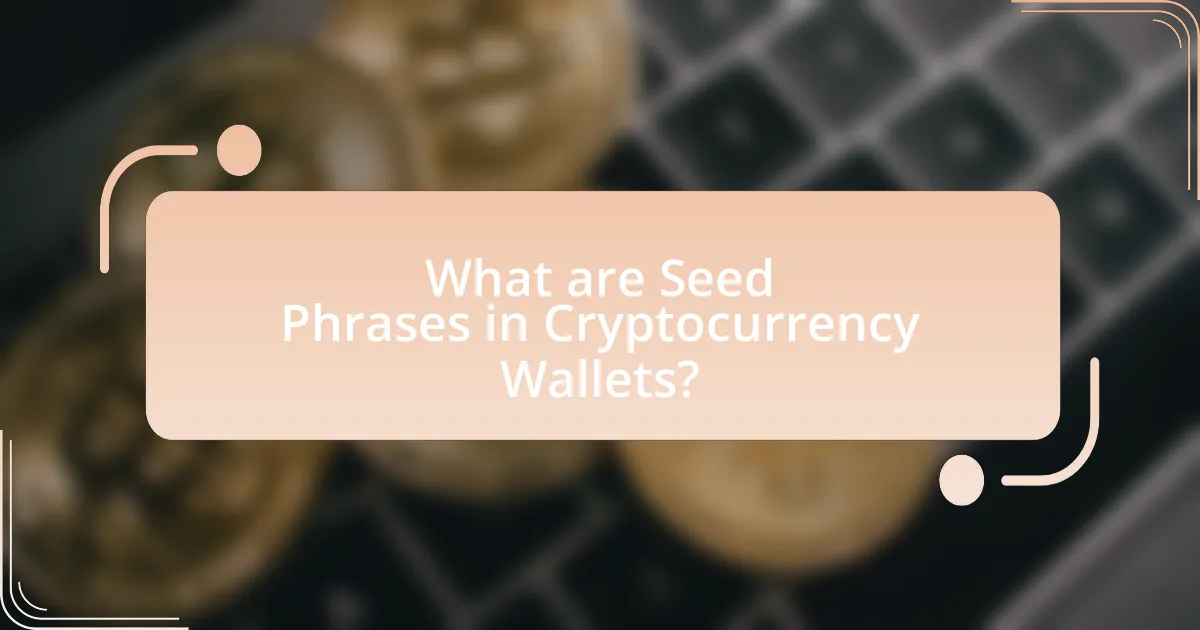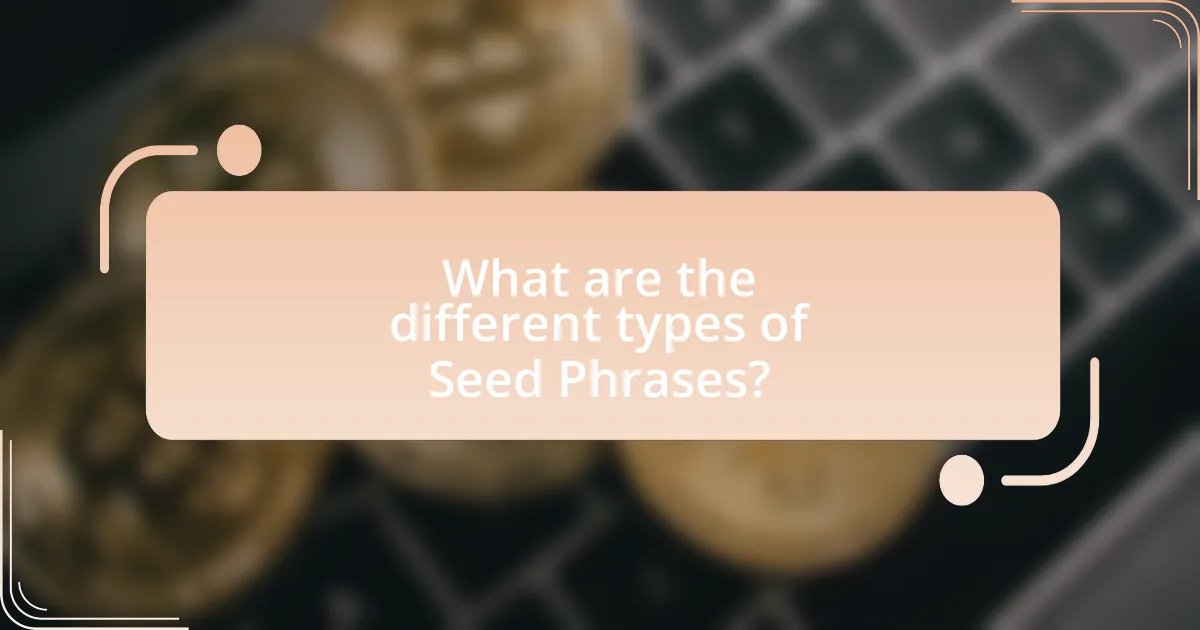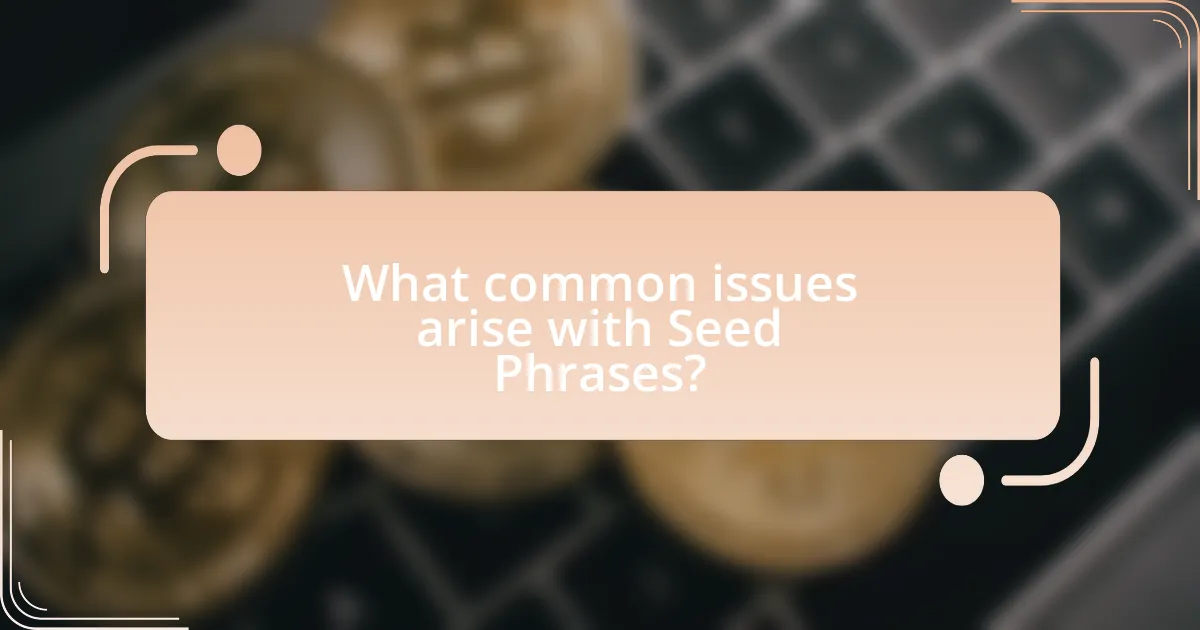Seed phrases are a critical component of cryptocurrency wallets, serving as a backup for accessing and recovering digital assets. Typically consisting of 12 to 24 words, these phrases are generated during wallet creation and are essential for restoring access in case of device loss or failure. The article explores the functionality of seed phrases, their relationship to private keys, and their importance for security in the cryptocurrency space. It also discusses the risks associated with losing seed phrases, best practices for management, and the implications of sharing them, emphasizing the need for secure storage and confidentiality to protect users’ assets.

What are Seed Phrases in Cryptocurrency Wallets?
Seed phrases in cryptocurrency wallets are a series of words that serve as a backup for accessing and recovering a wallet. Typically consisting of 12 to 24 words, these phrases are generated when a wallet is created and are crucial for restoring access to the wallet in case of device loss or failure. The use of seed phrases is standardized through the BIP39 protocol, which ensures that the same seed phrase will always generate the same wallet addresses and private keys, thus providing a reliable method for wallet recovery.
How do Seed Phrases function in the context of cryptocurrency wallets?
Seed phrases function as a secure method for generating and recovering cryptocurrency wallets. They consist of a series of words, typically 12 to 24, that represent a unique cryptographic seed used to derive all the private keys associated with a wallet. This means that anyone with access to the seed phrase can restore the wallet and access its funds, making it crucial for users to keep it confidential and secure. The use of seed phrases is standardized by the BIP39 protocol, which ensures that wallets from different providers can interpret the same seed phrase consistently, thus facilitating interoperability across various platforms.
What is the process of generating a Seed Phrase?
The process of generating a seed phrase involves creating a sequence of words that serves as a mnemonic representation of a cryptographic key. This process typically utilizes a standard called BIP39, which defines how to convert random entropy into a human-readable phrase.
First, a random number is generated, usually 128 to 256 bits in length, which ensures sufficient entropy for security. This random number is then processed through a hashing algorithm to produce a checksum. The entropy and checksum are combined to create a binary sequence, which is subsequently mapped to a list of predefined words from a wordlist, resulting in the final seed phrase.
The validity of this process is supported by the fact that BIP39 is widely adopted in the cryptocurrency industry, ensuring compatibility across various wallets and platforms. This standardization allows users to recover their wallets securely using the generated seed phrase.
How do Seed Phrases relate to private keys?
Seed phrases are a human-readable representation of a wallet’s private keys, allowing users to recover their cryptocurrency wallets. Each seed phrase is generated from a specific algorithm, typically BIP39, which creates a sequence of words that can be used to derive all associated private keys. This relationship means that anyone with access to the seed phrase can regenerate the private keys and, consequently, access the funds in the wallet. The security of a cryptocurrency wallet heavily relies on the confidentiality of the seed phrase, as its exposure compromises the private keys and the assets they control.
Why are Seed Phrases important for cryptocurrency security?
Seed phrases are crucial for cryptocurrency security because they serve as the primary means of accessing and recovering digital assets. A seed phrase, typically consisting of 12 to 24 words, generates the private keys needed to control a cryptocurrency wallet. If a user loses their wallet or device, the seed phrase allows them to restore access to their funds on any compatible wallet software. This importance is underscored by the fact that without the seed phrase, users risk permanent loss of their assets, as there is no central authority to recover lost keys. Therefore, safeguarding the seed phrase is essential to ensure the security and accessibility of cryptocurrency holdings.
What risks are associated with losing a Seed Phrase?
Losing a Seed Phrase poses significant risks, primarily the irreversible loss of access to cryptocurrency assets. When a Seed Phrase is lost, users cannot recover their wallets, leading to the permanent loss of any funds stored within. According to a study by Chainalysis, approximately 20% of all Bitcoin is considered lost, often due to lost Seed Phrases or private keys. This statistic underscores the critical importance of securely storing Seed Phrases, as their loss directly correlates with financial loss in the cryptocurrency space.
How do Seed Phrases protect against unauthorized access?
Seed phrases protect against unauthorized access by serving as a secure method for recovering cryptocurrency wallets. Each seed phrase is a unique sequence of words that generates the private keys needed to access and manage the funds within a wallet. If a user keeps their seed phrase confidential and secure, it prevents unauthorized individuals from accessing their wallet, even if they have the wallet’s address or other information. The security of seed phrases is reinforced by the fact that they are typically generated using cryptographic algorithms, making it computationally infeasible for attackers to guess or brute-force the correct phrase.

What are the different types of Seed Phrases?
There are primarily two types of seed phrases: mnemonic seed phrases and hierarchical deterministic (HD) seed phrases. Mnemonic seed phrases consist of a series of words that represent a cryptographic key, allowing users to recover their wallets. HD seed phrases, on the other hand, generate multiple addresses from a single seed, enabling users to manage multiple accounts while maintaining a single backup. Both types are essential for securing cryptocurrency wallets, as they provide a means to restore access to funds in case of device loss or failure.
How do BIP39 Seed Phrases differ from other types?
BIP39 seed phrases differ from other types of seed phrases primarily in their standardized method of generating mnemonic phrases from a binary seed. BIP39 utilizes a specific list of 2048 words to create a human-readable phrase that can represent a cryptographic seed, making it easier for users to back up and restore their wallets. In contrast, other seed phrase types may not follow a standardized word list or may use different methods for generating phrases, which can lead to compatibility issues across different wallets. BIP39’s standardization is supported by the Bitcoin Improvement Proposal documentation, which outlines its widespread adoption in various cryptocurrency wallets, ensuring that users can reliably recover their funds across different platforms.
What is the significance of the word list in BIP39 Seed Phrases?
The word list in BIP39 Seed Phrases is significant because it provides a standardized method for generating mnemonic phrases that represent a cryptographic seed. This standardization allows users to easily back up and restore their cryptocurrency wallets, ensuring that the seed phrases are both human-readable and machine-readable. The BIP39 word list consists of 2048 unique words, which are selected to minimize confusion and maximize memorability, thus enhancing security and usability. Each word corresponds to a specific binary value, allowing for the generation of a secure seed that can derive multiple cryptocurrency addresses.
How do different wallet implementations affect Seed Phrase types?
Different wallet implementations affect seed phrase types by determining the format and security of the seed phrases used for recovery. For instance, hierarchical deterministic (HD) wallets utilize BIP32 and BIP39 standards, generating seed phrases that are typically 12 to 24 words long, which provide a systematic way to derive multiple addresses from a single seed. In contrast, non-HD wallets may use simpler, less secure methods that can result in shorter or less complex seed phrases, potentially compromising recovery options. The adoption of BIP39 has standardized seed phrases across many wallets, enhancing interoperability and user experience, while variations in implementation can lead to differences in security and usability.
What are the best practices for managing Seed Phrases?
The best practices for managing seed phrases include storing them securely offline, using a hardware wallet, and creating multiple backups in different physical locations. Storing seed phrases offline prevents unauthorized digital access, while hardware wallets provide an additional layer of security by keeping the seed phrase isolated from online threats. Creating multiple backups ensures that even if one backup is lost or damaged, others remain accessible. According to the Federal Trade Commission, securing cryptocurrency wallets with strong, unique passwords and enabling two-factor authentication further enhances protection against theft.
How should users securely store their Seed Phrases?
Users should securely store their Seed Phrases by writing them down on paper and keeping them in a safe, offline location. This method protects against digital theft and hacking, which are prevalent risks in the cryptocurrency space. According to a study by the Blockchain Research Institute, 20% of cryptocurrency holders have lost access to their funds due to poor seed phrase management. Therefore, using a fireproof and waterproof safe or a safety deposit box can further enhance security, ensuring that the Seed Phrase remains intact and accessible only to the owner.
What methods can be used to back up Seed Phrases effectively?
To back up seed phrases effectively, users can employ methods such as writing them down on paper, using metal backup devices, or utilizing secure digital storage solutions. Writing seed phrases on paper ensures that they are stored offline, reducing the risk of hacking, while metal backup devices provide durability against fire and water damage. Secure digital storage solutions, such as encrypted USB drives or password-protected cloud services, offer convenience but require careful management of security protocols to prevent unauthorized access. These methods are widely recommended in cryptocurrency security best practices, emphasizing the importance of safeguarding seed phrases to prevent loss of access to digital assets.

What common issues arise with Seed Phrases?
Common issues that arise with seed phrases include loss of access, theft, and mismanagement. Loss of access occurs when users forget or misplace their seed phrases, leading to permanent loss of their cryptocurrency assets. Theft can happen if seed phrases are stored insecurely, making them vulnerable to hacking or physical theft. Mismanagement often involves users writing down seed phrases incorrectly or storing them in easily accessible locations, increasing the risk of unauthorized access. These issues highlight the critical importance of securely managing seed phrases to protect cryptocurrency holdings.
What happens if a Seed Phrase is forgotten or lost?
If a seed phrase is forgotten or lost, access to the associated cryptocurrency wallet and its funds is permanently lost. Seed phrases are the only means to recover wallets, as they generate private keys necessary for accessing the stored assets. Without the seed phrase, there are no alternative recovery methods available, making it crucial for users to securely store their seed phrases. This fact is supported by the fundamental design of cryptocurrency wallets, which prioritize user control and security, emphasizing the importance of safeguarding seed phrases to prevent irreversible loss of funds.
Are there recovery options available for lost Seed Phrases?
No, there are no reliable recovery options available for lost seed phrases. Seed phrases are designed to be the sole access point to a cryptocurrency wallet, and if they are lost, the associated funds are typically irretrievable. This is due to the decentralized nature of blockchain technology, which does not allow for password recovery or account recovery mechanisms. Therefore, the loss of a seed phrase results in permanent loss of access to the wallet and its contents.
How can users prevent the loss of their Seed Phrases?
Users can prevent the loss of their Seed Phrases by securely storing them in multiple physical locations. This method ensures that even if one copy is lost or damaged, others remain accessible. For instance, writing the Seed Phrase on paper and placing it in a safe deposit box or a fireproof safe can provide physical security. Additionally, using hardware wallets that encrypt Seed Phrases adds another layer of protection, as these devices are designed to keep sensitive information secure from unauthorized access. According to a study by the Blockchain Research Institute, 20% of cryptocurrency users have lost access to their wallets due to misplaced Seed Phrases, highlighting the importance of proper storage methods.
What are the implications of sharing Seed Phrases?
Sharing seed phrases can lead to the complete loss of control over cryptocurrency assets. When an individual shares their seed phrase, they effectively grant access to their wallet, allowing others to transfer or steal funds without any recourse. This risk is underscored by the fact that seed phrases are the keys to accessing and managing digital assets; losing them or sharing them compromises the security of the wallet. According to a report by Chainalysis, over $3.2 billion in cryptocurrency was stolen in 2021, with many incidents linked to compromised seed phrases. Thus, sharing seed phrases poses significant security risks and can result in irreversible financial loss.
Why should users never share their Seed Phrases?
Users should never share their Seed Phrases because doing so compromises the security of their cryptocurrency wallets. Seed Phrases serve as the master key to access and control digital assets; if someone else obtains this phrase, they can easily gain unauthorized access to the user’s funds. According to the Federal Trade Commission, sharing sensitive information like Seed Phrases can lead to theft and loss of assets, as it allows malicious actors to transfer or drain funds without the owner’s consent. Therefore, maintaining the confidentiality of Seed Phrases is crucial for safeguarding one’s cryptocurrency investments.
What are the potential consequences of sharing a Seed Phrase?
Sharing a Seed Phrase can lead to the complete loss of access to cryptocurrency assets. When an individual discloses their Seed Phrase, anyone who obtains it can control the associated wallet, allowing them to transfer or spend the funds without the original owner’s consent. This risk is underscored by numerous incidents in the cryptocurrency space, where users have lost significant amounts of money due to phishing attacks or social engineering tactics that exploit shared Seed Phrases. For example, in 2021, a report by the blockchain analytics firm Chainalysis indicated that over $7.7 billion in cryptocurrency was stolen, much of which was attributed to compromised private keys and Seed Phrases.
What practical tips can help users manage their Seed Phrases?
To effectively manage Seed Phrases, users should securely store them offline, preferably in a physical format such as writing them down on paper or using a metal backup. This method minimizes the risk of digital theft, as Seed Phrases are vulnerable to online attacks. Additionally, users should create multiple copies and store them in different secure locations to prevent loss due to theft, fire, or water damage. It is also advisable to avoid sharing Seed Phrases with anyone and to use strong passwords for any associated accounts. These practices are essential because Seed Phrases are the keys to accessing cryptocurrency wallets, and their security directly impacts the safety of users’ digital assets.